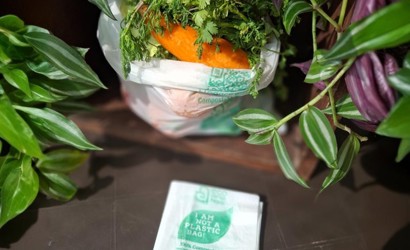Our Blog
From Innovation to Pollution: Plastics Journey

From Innovation to Pollution: The Journey of Plastic Bags and the Need for Compostable Alternatives
Plastic bags were once introduced as an innovative solution to environmental challenges. In the 1960s, Swedish engineer Sten Gustaf Thulin created the plastic bag to address concerns over deforestation caused by paper bags. Strong, waterproof, and reusable, plastic bags seemed like the perfect alternative at the time. They promised durability and convenience, aligning with the goal of reducing waste and preserving natural resources. However, over time, plastic became more disposable and cheap, resulting in an environmental crisis that is now affecting our rivers, mountains, and oceans.
The Rise of Disposable Plastics
The affordability and convenience of plastic soon overshadowed its reusability. Instead of using them repeatedly, plastic bags were discarded after single use. Today, more than 300 million tons of plastic are produced annually, and 5 trillion plastic bags are used each year. Unfortunately, most of these bags end up in the environment, taking centuries to decompose. This has led to an overwhelming amount of plastic waste in our ecosystems, including Nepal’s precious rivers and mountains.
In Nepal, the impact of plastic pollution is particularly evident in rivers like the Bagmati and Mount Everest, where climbers leave behind waste, much of it made of plastic. The waste left behind by Everest climbers, for example, consists mainly of plastic bags, bottles, and wrappers, all of which add to the pollution of our pristine environment. This plastic pollution affects wildlife, pollutes water sources, and tarnishes Nepal's natural beauty, leading to a loss of biodiversity and threatening the health of the environment.
The Hidden Costs of Plastic Pollution
Plastic pollution is not just a marine issue; it has far-reaching consequences for all ecosystems, including those in Nepal. Plastic waste pollutes rivers and streams, impacting local communities who depend on these water sources. In the mountains, plastic disrupts fragile habitats, and when it eventually breaks down, it releases harmful chemicals into the soil and water. These chemicals can make their way into the food chain, endangering both wildlife and humans.
Moreover, plastic waste is not only a threat to natural ecosystems but also contributes to air pollution and climate change. Burning plastics releases harmful dioxins and greenhouse gases, exacerbating global warming.
Small Steps Toward Big Change: The Shift to Compostable Alternatives
The good news is that solutions are within reach. Around the world, communities are turning to sustainable alternatives to combat the plastic pollution crisis:
- Biodegradable bags made from plant-based materials that break down naturally.
- Compostable bags that decompose into non-toxic substances and leave no harmful residue behind.
- Reusable shopping bags made from organic cotton, jute, or other eco-friendly materials.
- Eco-friendly plastic bags that use biodegradable additives to reduce environmental harm.
- Beeswax wraps and metal straws as alternatives to single-use plastics.
Governments and businesses are also responding. In Nepal, many local areas have already introduced plastic bans, and there is growing awareness of the need for compostable packaging and eco-friendly solutions to replace disposable plastics. By adopting biodegradable materials and promoting a circular economy, we can make a significant difference in reducing pollution and protecting our natural resources.
What Can You Do?
Change begins with us. Here are some simple actions you can take to help reduce plastic pollution in Nepal:
- Say no to single-use plastic bags—carry a reusable bag or compostable bag instead.
- Avoid products with excessive plastic packaging—look for eco-friendly alternatives.
- Support brands that prioritize biodegradable and compostable bags and other sustainable practices.
- Educate others about the impact of plastic pollution and the importance of eco-friendly alternatives.
Each small action adds up. If every person in Nepal refused just one plastic bag per day, we could significantly reduce plastic waste—helping keep our rivers, mountains, and oceans clean for future generations.
Eco Wrap Nepal: Leading the Charge
At Eco Wrap Nepal, we are committed to providing sustainable, compostable bags and biodegradable alternatives to reduce plastic waste. We believe that small changes in daily habits can lead to big environmental impacts. By shifting to eco-friendly plastic bags and other biodegradable products, we can help protect Nepal’s beautiful landscapes, clean rivers, and majestic mountains.
The journey to a plastic-free planet won’t happen overnight, but with collective action, a sustainable future is within our reach. 🌍















